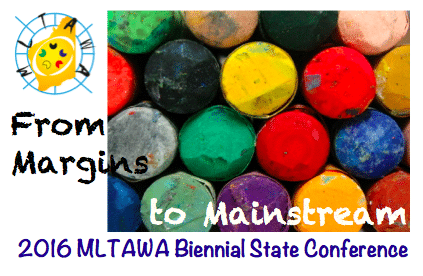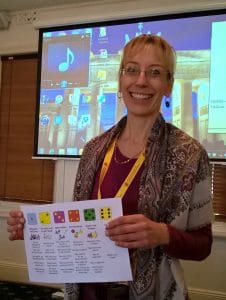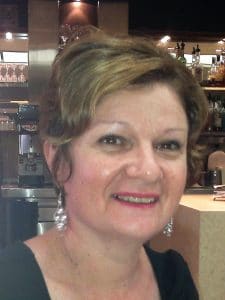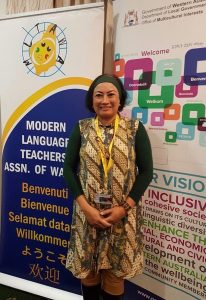Conference Reports

If you missed our recent Conference, hear what some of our members had to say about it. The following members were recipients of conference scholarships:
Tanja Colgan
 Am I really giving up Friday and Saturday, to sit in a big room and listen to other people say how wonderful it is to teach a language? After all, the reality is totally different. Out there, you are on your own, fighting the everyday battle with little support from staff. Being the master DOTT provider. Unfortunately for some, that is the reality.
Am I really giving up Friday and Saturday, to sit in a big room and listen to other people say how wonderful it is to teach a language? After all, the reality is totally different. Out there, you are on your own, fighting the everyday battle with little support from staff. Being the master DOTT provider. Unfortunately for some, that is the reality.
My family calls me a ‘conference junkie’ and I must admit I really enjoy attending conferences. Meeting people, exchanging ideas and listening to new research gives me the buzz and empowers me to try new things. It gives me a feeling of belonging and confirms that I am actually doing a good job in doing what I love doing: teaching German.
Attending this conference and listening to amazing speakers like Professor Joseph Lo Bianco was uplifting. Statements from him such as “We should make bilingualism a normal achievement for all learners” or, “Language is alive” get stuck in your head.
Whether it’s the Minister of Education, Hon Peter Collier pointing out how important teaching languages is for improving students’ critical thinking, numeracy and literacy skills, or CEO of School Curriculum and Standards’ Authority, Allan Blagaich, presenting the new policy on teaching, assessing and reporting, or the panel at the end of the day on Saturday, the message is clear: We are on the right track and together we can do it. There is support. Nothing is impossible. If something gets in our way, you have to step around it and try it a different way.
I enjoyed every single workshop . They were all very professional, interactive and entertaining. While learning about the creating strand, presented by Natalie Pearce, at the same time I picked up the words for small and big in Japanese. There were enough opportunities to talk about my own experiences and listen to others. After scoring not too badly in Mariel Howard’s” Kahoot pre-test” on differentiation, I felt relieved and was keen to learn more about it. Steve Collis’ demonstration on embedding choice and optionality in Learning Program Design was full of team-based and hands-on activities. We had a good laugh, drew on the wall and made up weird personalities.
A workshop on Aboriginal language was an eye opener, on how much history and understanding is needed to learn the language. Just to name an example: I never thought about how important legs were to Aborigines, if not the most important body part. Makes sense when you think about it. They had to walk very long distances to get from A to B. Therefore, if you don’t look after your hips, knees and feet, the chances to arrive in one piece were rather small.
The German symposium was very engaging, interactive and motivating. We shared great ideas and will continue to support each other on our journey.
This is what I took home from the conference: Everyone is time poor these days. Everyday, we are expected to do more and more. Cooperation and networking helps us on down days, and to keep the workload lower. Doing little steps, is better than reaching out too far.
Listening to Gary Marin about leadership, made me think that we are all already leaders, everyone in their own way (some with a title, some without). But by spending the last two days here at the conference, sharing ideas, helping each other, I am sure that we will go on to inspire, influence and have an impact on someone. Thanks for this great conference!
Rosaria Rossi
 My name is Rosaria Rossi and I was the fortunate recipient of the 2016 MLTAWA Conference Scholarship. The talk I have chosen to write about was presented by Dr Annamaria Paolino. This choice was driven partly by my initial involvement in this research and, secondly, because I am very passionate about the use and benefits of music in the L2 classroom.
My name is Rosaria Rossi and I was the fortunate recipient of the 2016 MLTAWA Conference Scholarship. The talk I have chosen to write about was presented by Dr Annamaria Paolino. This choice was driven partly by my initial involvement in this research and, secondly, because I am very passionate about the use and benefits of music in the L2 classroom.
Since the start of my teaching career, around twenty-two years ago, I have found it to be a challenge locating useful and age-appropriate songs, which could be incorporated into my lessons of primary Italian. This was due to the language content generally being too complex for our junior students, as well as not content-suitable for the older grades. All this led me to start creating my own songs and movements, as I have increasingly experienced substantial success when using music as part of my lessons, especially when creating songs that directly relate to the topic being covered, followed by the relevant practice and assessment tasks.
In the past, I have not researched this correlation in depth, mostly basing it on the successful results I was experiencing, such as greater student participation. This is why I chose this lecture, which has given me the theoretical background confirming the effectiveness of using music in the L2 classroom, with a particular focus on the Orff-Schulwerk approach. Orff-Schulwerk is a general music education approach developed in the 1930’s by German composer Carl Orff. Since the 1950’s it has been popular in the field of music education. It offers an active and creative approach to music making with its principle concept being the unity of music, movement and speech with rhythm. Orff-Schulwerk is multi-dimensional (cognitive) as well as multisensory (perceptual), thus combining the cognitive, kinaesthetic, emotional and affective domains. The Orff-Schulwerk pedagogy is underpinned by the belief that children need countless experiences in inventing and playing with sound before being presented with the musical notation. This is the same as language acquisition as language is primarily acquired by hearing and speaking. It is only much later that the reading and writing of language happens. It is the orientation of hearing and, making sounds and rhythms first, before learning to read and write that can transform traditional foreign language classes into engaging, fun, and effective ones. The disposition of children towards rhythm and melody makes music an ideal tool for the macro skills of language learning such as; listening, speaking, reading and writing.
As mentioned by Dr Annamaria Paolino, the singing, chanting, clapping, creating, dancing and keeping beat are very effective ways to involve the students and improve the assimilation and retention of the language content being taught. Another very salient point made in this lecture was how this holistic approach consists of more than just anatomical parts and that, as teachers, we should be considering the entire package: physical, emotional, social, cultural and cognitive parts. By exploring the language, the instruments (both musical and vocal) and their bodies, students become active participants, therefore, more engaged and confident.
Dian Leggett
 I am very thankful to the MLTAWA for the opportunity given to me to attend this fantastic conference. Not only did I learn about what has been happening in language learning in Australian schools from the experts but it also provided me with ideas and initiatives in my teaching. I was particularly impressed with Professor Lo Bianco’s presentation when he challenged us with the crisis of the language learning in Australian schools. He pointed out that bilingualism has not been taken seriously in public education in Australia. He also indicated that most language learners discontinue the language study by Year 12 and as an English speaking country, the bilingualism in Australia is only concentrated among immigrant population, indigenous groups, professionals and elite in politics. What should we do?
I am very thankful to the MLTAWA for the opportunity given to me to attend this fantastic conference. Not only did I learn about what has been happening in language learning in Australian schools from the experts but it also provided me with ideas and initiatives in my teaching. I was particularly impressed with Professor Lo Bianco’s presentation when he challenged us with the crisis of the language learning in Australian schools. He pointed out that bilingualism has not been taken seriously in public education in Australia. He also indicated that most language learners discontinue the language study by Year 12 and as an English speaking country, the bilingualism in Australia is only concentrated among immigrant population, indigenous groups, professionals and elite in politics. What should we do?
This becomes everybody’s responsibility to change the mindset of monolingualism in Australia. The policy from the bottom-up and top-down elements are needed which focus on all community institutions and promote multilingualism for all as a national asset. Prof Lo Bianco suggested COD: Capacity, Opportunity and Desire. Capacity is developed in 2 ways, Informal (“Intimacy” in homes, families and other relationship) and Formal (“Instruction” in education system with teachers and lectures). He added that Intimacy and Instruction are sufficient to produce knowledge and use of mother tongue. Opportunity to use the second language is expected to be as normal as possible. The expected communication in the target language should be informal learning in intimacy which of course needs the Desire from the language learners.
Pania Wirepa
The Biennial State Conference for Languages, held in August 2016, was a motivating forum where teachers from Western Australia and across the nation joined together to discuss their passion, and at times, frustrations in relation to teaching languages. The name ‘From Marg ins to Mainstream’ itself is an indication of the current language curriculum in WA. As teachers, we are all well aware of the countless benefits of learning a language including the importance of cultural awareness, but also the benefits both socially and cognitively. Our challenge is to spread our passion for languages into the mainstream, influencing others and getting them to perceive them as an essential part of learning in Western Australia.
ins to Mainstream’ itself is an indication of the current language curriculum in WA. As teachers, we are all well aware of the countless benefits of learning a language including the importance of cultural awareness, but also the benefits both socially and cognitively. Our challenge is to spread our passion for languages into the mainstream, influencing others and getting them to perceive them as an essential part of learning in Western Australia.
Keynote speaker Jo Lo Bianco was inspirational with his deliberation about the state of languages not only in Australia but worldwide. The fact that such a fluid, integral part of human interaction, language, is at risk in the education system is almost incomprehensible. Seventy percent of languages in the world will be extinct within two generations! In Australia, there are great problems both politically and systemically with language learning.
Despite the challenges faced by language teachers being a focus of discussions, there was still such a positive vibe from all present at the conference. It was refreshing to hear from room to room quotes like language is a human heart, a living organism. References were made to language as an essential part of human spirit and how we as teachers create humming classrooms filled with life. The conference was a heartening reminder that the state of affairs with language education in WA is on the rise with exciting new programs for Indigenous languages, Arabic and Spanish just to mention a few.
The Association of Spanish Teachers WA (ASTWA) had a symposium promoting their new association and outlining the growth in numbers of people studying Spanish in Perth. Representatives from the Spanish community also contributed to talks on the day. It is apparent that Spanish in Perth has a bright future. Watch this space for more on ASTWA related initiatives.
With the excitement and buzz created by the innovative language teachers, advocates and supporters being all in one space, it was difficult not to leave with renewed energy to take away from the conference. Fortunately, there are language teachers, just like you and me to continue to motivate our colleagues, family, friends and most importantly young students to embrace language learning well into the future.

Leave a Reply